This post originally ran on October 26, 2011, back when Donald Trump was relentlessly propagating an easily debunked conspiracy theory about President Obama. As we ponder the triumph of “alternative facts,” it’s worth considering what makes bullshit so appealing and why it’s so hard to debunk. Earlier this month, I gave an Ignite talk at the National Association of Science Writers meeting.
Earlier this month, I gave an Ignite talk at the National Association of Science Writers meeting.
(I also organized a panel on covering scientific controversies–click here to listen to/download mp3s of my interviews with panelists Gary Taubes, Jennifer Kahn, Jeanne Lenzer and Brian Vastag.)
I’ve had numerous requests to share my Ignite talk, and so in an attempt to replicate the experience, I’ve put together a storyboard/slideshow.
Here it goes…
I’m here to tell you what more than a dozen years worth of reader letters have taught me about science writing. I had a list of about 20 lessons, but I have only five minutes, so I’ve scrapped all but one.
Which is—tell readers that they’re wrong about something they know in their heart to be true, and they will send you hate mail. For instance… I just wrote about how it’s tumor biology and not a person’s attitude that determines whether cancer their cancer progresses. A reader sent me this comment.
I’ve written numerous stories about how mammograms are more likely to turn a healthy woman into a cancer patient than they are to save her life. Those stories bring mail like this.
I’ve also written about climate change, which elicits letters like this one, which told me I needed therapy to…
But these are nothing compared to the letters I got when I wrote about how taking a multivitamin won’t make you any healthier. Mind you, this was not ground breaking news. It was a long, slow accumulation of studies showing that vitamins don’t prevent cancer or heart disease or strokes or a bunch of other scary things. Oh did I get hate mail.
 Of course, my editors helped things along. Here’s the coverline they gave the story.
Of course, my editors helped things along. Here’s the coverline they gave the story.
A lot people obviously never read any further. We got piles and piles of nasty letters, some sort of record.
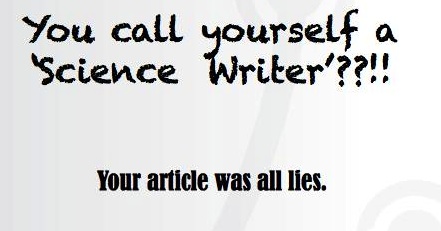 Now it’s tempting to dismiss these angry readers as a bunch of idiots. But they’re not, and the truth is, I know where they’re coming from. I’ve been that person.
Now it’s tempting to dismiss these angry readers as a bunch of idiots. But they’re not, and the truth is, I know where they’re coming from. I’ve been that person.
I’m married to an amazing guy. Dave is like those honeybees that always know the way back to the hive. Me, I’ve gotten myself lost in the Hearst building.
We’ll be hiking and we’ll come to a split in the trail and I’ll point one way and say, we need to go here. And Dave will say no, actually, this is the right way (as he points in the opposite direction). And I’ll insist that, no, this is the way.
 And then he’ll point out that my way peters out below some cliff face. Which only pisses me off. The more evidence he shows me that I’m wrong, the more insistent I become — I’m right and he’s wrong.
And then he’ll point out that my way peters out below some cliff face. Which only pisses me off. The more evidence he shows me that I’m wrong, the more insistent I become — I’m right and he’s wrong.
And it’s not just me. This political scientist named Brendan Nyhan at Dartmouth has documented what happens when you show people evidence that their beliefs are wrong.
 Instead of thinking, hmmmm, maybe I need to reassess here, what most of us do is go back and think about why we’d come to those beliefs in the first place. And in the process of doing that, we remember how great those reasons were and we end up reinforcing our original beliefs. Instead of re-evaluating, you become more sure of yourself.
Instead of thinking, hmmmm, maybe I need to reassess here, what most of us do is go back and think about why we’d come to those beliefs in the first place. And in the process of doing that, we remember how great those reasons were and we end up reinforcing our original beliefs. Instead of re-evaluating, you become more sure of yourself.
So when Dave tells me that his way is right and mine is straight up a cliff, I think, oh yeah? Well I’m smart, independent and capable, so therefore I’m correct. I would never point us in the wrong direction.
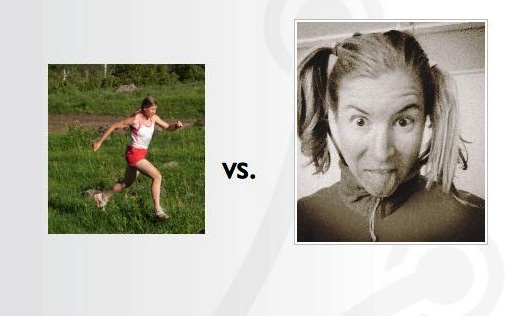 See, it’s never really about the hiking trail. It’s about some bigger story you’ve told yourself. I’m not taking issue with Dave’s direction. I know he’s right. But the factual mumbo jumbo he’s showing me clashes with the story I’ve told myself. I don’t like what it says about me.
See, it’s never really about the hiking trail. It’s about some bigger story you’ve told yourself. I’m not taking issue with Dave’s direction. I know he’s right. But the factual mumbo jumbo he’s showing me clashes with the story I’ve told myself. I don’t like what it says about me.
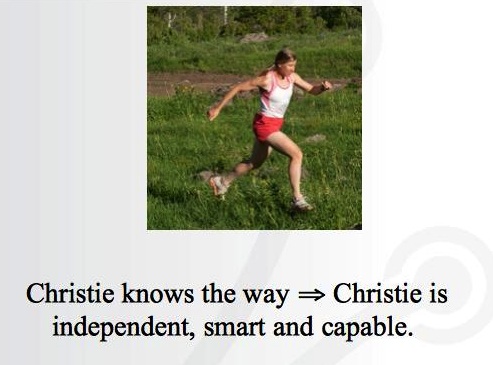 The idea that I could be giving wrong directions contradicts the vision I have of myself as a competent person. I’m sure that I know the right direction, because I’m too smart to lead us astray.
The idea that I could be giving wrong directions contradicts the vision I have of myself as a competent person. I’m sure that I know the right direction, because I’m too smart to lead us astray.
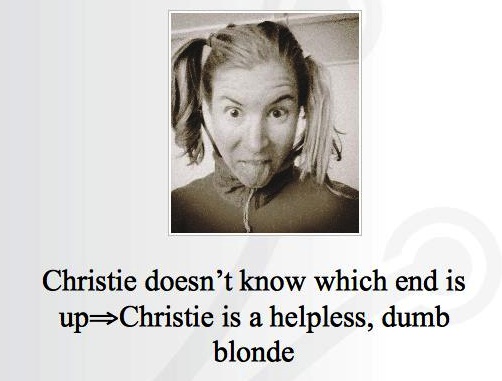 When Dave points out that I am directing us to a cliff face, here’s how I process the evidence. Dave’s way =I’m a helpless, dumb blonde. But I’m not a dumb blonde, I know I’m not, and so I reject his facts.
When Dave points out that I am directing us to a cliff face, here’s how I process the evidence. Dave’s way =I’m a helpless, dumb blonde. But I’m not a dumb blonde, I know I’m not, and so I reject his facts.
Which is the same thing that happens when the vitamin takers read my story.
They see the vitamin headline and they hear: your vitamin pill is a worthless scam, sucker! And then they think, no way! I’m no sucker — therefore this article is wrong. They reject the evidence.
 Because the story they’ve told themselves is that they’re smart and “proactive” for taking the vitamin. In that story, it’s possible to protect yourself from scary diseases by taking a vitamin pill. And honestly, who doesn’t want to live in that world?
Because the story they’ve told themselves is that they’re smart and “proactive” for taking the vitamin. In that story, it’s possible to protect yourself from scary diseases by taking a vitamin pill. And honestly, who doesn’t want to live in that world?
 Of course, I heard lots of other stories too, about the soil and mother earth and evil pharmaceutical companies.
Of course, I heard lots of other stories too, about the soil and mother earth and evil pharmaceutical companies.
The bottom line is, people believe what they want to believe. It doesn’t matter what you’re writing about. People don’t want to know that they could do everything right and still die of cancer. I don’t want to know that I might not be as brilliant as I think I am. So we reject the facts and fall back on our worlds of truthiness.
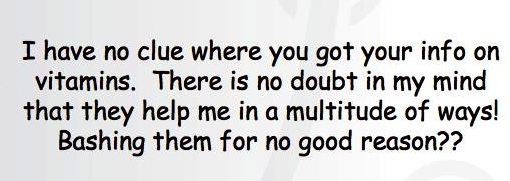 And personal anecdote. Don’t even bother trying to overturn those with facts. No study will ever convince the people who are certain that the vitamin helped them. I’m not sure it’s possible to convince people with data that contradict their personal experience.
And personal anecdote. Don’t even bother trying to overturn those with facts. No study will ever convince the people who are certain that the vitamin helped them. I’m not sure it’s possible to convince people with data that contradict their personal experience.
But I know this: if you’re going to have any hope whatsoever, you have to speak to their story. Because that’s what you’re competing against.
 Here are two letters I received about the very same article. I know which one I believe.
Here are two letters I received about the very same article. I know which one I believe.
I’m Christie Aschwanden. Send me a letter!
(Or leave your comment below.)
***
Rob Frederick, multimedia journalist extraordinaire, was kind enough to take a video of my talk. Watch it here: Ignite Video
Photo credits: Christie at NASW by Carol Berkower.
Christie and Dave hiking by Patitucci Photo.
Brendan Nyhan from Dartmouth.
Christie running with confidence by JT Thomas.
Ditzy Christie is a selfie.




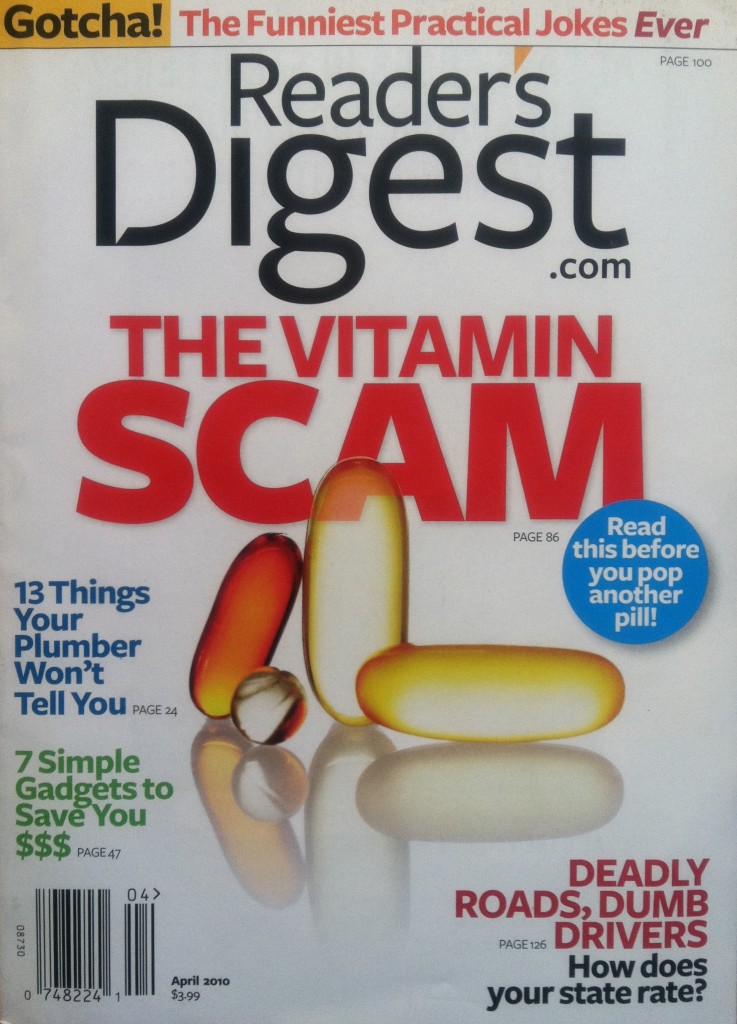

It’s sad that nothing changed in the meantime. That said, I chuckled when I first read this and that didn’t change either the second time.
I been thinking a lot about your post since I read it on Monday. I missed this the first time around; thanks for reposting. At the risk of confirming your biases and my own: Nice job! Well done!
Great post and completely true. There are some folks who can process new information, but they are on the margins. The recent work on this subject by Jonathan Haidt has been really instructive.